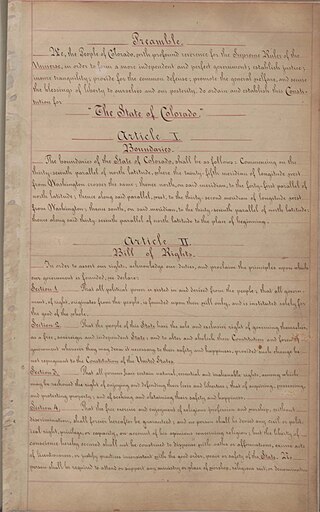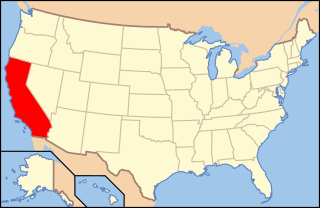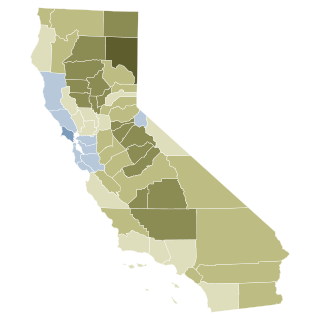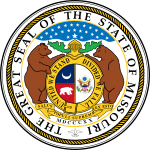In the context of labor law in the United States, the term right-to-work laws refers to state laws that prohibit union security agreements between employers and labor unions. Such agreements can be incorporated into union contracts to require employees who are not union members to contribute to the costs of union representation. Unlike the right to work definition as a human right in international law, U.S. right-to-work laws do not aim to provide a general guarantee of employment to people seeking work but rather guarantee an employee's right to refrain from being a member of a labor union.
Same-sex marriage has been legal in California since June 28, 2013. The State of California first issued marriage licenses to same-sex couples from June 16, 2008 to November 5, 2008, a period of approximately 4 months, 2 weeks and 6 days, as a result of the Supreme Court of California finding in the case of In re Marriage Cases that barring same-sex couples from marriage violated the Constitution of California. The issuance of such licenses was halted from November 5, 2008 through June 27, 2013 due to the passage of Proposition 8—a state constitutional amendment barring same-sex marriages. The granting of same-sex marriages recommenced following the U.S. Supreme Court's decision in Hollingsworth v. Perry, which restored the effect of a federal district court ruling that overturned Proposition 8 as unconstitutional.
A California domestic partnership is a legal relationship, analogous to marriage, created in 1999 to extend the rights and benefits of marriage to same-sex couples. It was extended to all opposite-sex couples as of January 1, 2016 and by January 1, 2020 to include new votes that updated SB-30 with more benefits and rights to California couples choosing domestic partnership before their wedding. California Governor Newsom signed into law on July 30, 2019.

A ballot proposition in the state of Arizona refers to any legislation brought before the voters of the state for approval.
Reitman v. Mulkey, 387 U.S. 369 (1967), was a United States Supreme Court decision that set an important legal precedent that held that a state could not authorize invidious discrimination by private landlords without entangling itself in the ensuing discriminatory private decisions. Thus, the state constitutional amendment by referendum purporting to authorize landlord freedom was unconstitutional.

The Constitution of the State of Colorado is the foundation of the laws and government of the U.S. state of Colorado. The Colorado State Constitution was drafted on March 14, 1876; approved by Colorado voters on July 1, 1876; and took effect upon the statehood of Colorado on August 1, 1876. As of 2020, the constitution has been amended at least 166 times. The Constitution of Colorado derives its authority from the sovereignty of the people. As such, the people of Colorado reserved specific powers in governing Colorado directly; in addition to providing for voting for Governor, state legislators, and judges, the people of Colorado have reserved initiative of laws and referendum of laws enacted by the legislature to themselves, provided for recall of office holders, and limit tax increases beyond set amounts without explicit voter approval, and must explicitly approve any change to the constitution, often with a 55% majority. The Colorado state constitution is one of the longest in the United States.

Eric Robert Greitens is an American businessman, author, former politician and former Navy SEAL, who served as the 56th governor of Missouri from January 2017 until June 2018, when he resigned that month amid allegations of sexual assault and campaign finance impropriety. He is a member of the Republican Party, and was a Democrat until 2015.
Same-sex marriage has been legally recognized in Nevada since October 9, 2014, when a federal district court judge issued an injunction against enforcement of Nevada's same-sex marriage ban, acting on order from the Ninth Circuit Court of Appeals. A unanimous three-judge panel of the Ninth Circuit had ruled two days earlier that the state's ban on same-sex marriage was unconstitutional. Same-sex marriage was previously banned by an amendment to the Constitution of Nevada, which was approved by voters in 2002. The statutory ban on same-sex marriages was repealed by the Nevada Legislature in 2017, and the constitutional ban was repealed by voters in 2020 by 62–38 percent.

California is seen as one of the most liberal states in the U.S. in regard to lesbian, gay, bisexual, transgender, and queer (LGBTQ) rights, which have received nationwide recognition since the 1970s. Same-sex sexual activity has been legal in the state since 1976. Discrimination protections regarding sexual orientation and gender identity or expression were adopted statewide in 2003. Transgender people are also permitted to change their legal gender on official documents without any medical interventions, and mental health providers are prohibited from engaging in conversion therapy on minors.

The California state elections was held on Election Day, November 6, 2012. On the ballot were eleven propositions, various parties' nominees for the United States presidency, the Class I Senator to the United States Senate, all of California's seats to the House of Representatives, all of the seats of the State Assembly, and all odd-numbered seats of the State Senate.

Michael Lynn Parson is an American politician and former law enforcement officer who served as the 57th governor of Missouri, from 2018 to 2025. A member of the Republican Party, Parson assumed the governorship upon the resignation of Eric Greitens, under whom he served as lieutenant governor from 2017 to 2018. Parson served the remainder of Greitens's term and was elected governor in his own right in 2020.

The Ohio Collective Bargaining Limit Repeal appeared on the November 8, 2011 general election ballot in the state of Ohio as a veto referendum. Senate Bill 5 (SB5) was repealed by Ohio voters after a campaign by firefighters, police officers and teachers against the measure, which would have limited collective bargaining for public employees in the state. The formal title of the proposal that this measure nullified is Senate Bill 5. Among other provisions, SB 5 would have prevented unions from charging fair share dues to employees who opt out. The process to place the referendum on the ballot for voters to decide was completed by supporters, as signatures were certified by the Ohio Secretary of State. The group behind the referendum effort was the political action committee We Are Ohio.

Robert Frank Onder Jr. is an American politician and physician from the state of Missouri. He is the member of the United States House of Representatives for Missouri's 3rd congressional district.

Mary Beth Carozza is an American politician who is a Republican member of the Maryland Senate, representing District 38. She previous represented District 38C in the Maryland House of Delegates from 2015 to 2019.

A general election was held in the U.S. state of Illinois on November 8, 2022. The elections for United States Senate and United States House of Representatives, Governor, statewide constitutional officers, Illinois Senate, and Illinois House were held on this date.

Proposition 16 was a failed California ballot proposition that appeared on the November 3, 2020, general election ballot, asking California voters to amend the Constitution of California to repeal Proposition 209 (1996). Proposition 209 amended the state constitution to prohibit government institutions from considering race, sex, or ethnicity, specifically in the areas of public employment, public contracting, and public education. Therefore, Proposition 209 banned the use of race- and gender-based affirmative action in California's public sector and public university admissions.

Proposition 25, officially the Referendum to Overturn a 2018 Law That Replaced Money Bail System with A System Based on Public Safety Risk, is a California ballot proposition that appeared on the ballot for the general election on November 3, 2020. The "no" side prevailed, resulting in retention of the system of cash bail in the state.

The Richard L. TrumkaProtecting the Right to Organize Act, or PRO Act, is a proposed United States law that would amend previous labor laws such as the National Labor Relations Act for the purpose of expanding "various labor protections related to employees' rights to organize and collectively bargain in the workplace.” The measure would prevent employers from holding mandatory meetings for the purpose of counteracting labor organization and would strengthen the legal right of employees to join a labor union. The bill would also permit labor unions to encourage secondary strikes. The PRO Act would weaken "right-to-work" laws, which exist in 27 U.S. states. It would allow the National Labor Relations Board to fine employers for violations of labor law, and would provide compensation to employees involved in such cases. It is named after Richard Trumka, who was elected president of the AFL-CIO on September 16, 2009, and served in that office until his death in August 5, 2021.
The following is a list of ballot measures, whether initiated by legislators or citizens, which had been certified to appear on various states' ballots during the 2024 United States elections. Those which did not make on the ballot are included on the page but their status is noted that they did not appear on the ballot.














